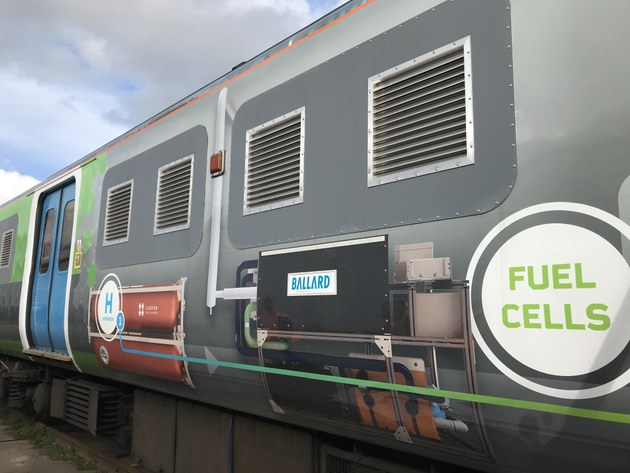May 29 2020
A research partnership between the Technische Universität Dresden (TU Dresden), the University of Birmingham, and Rock Rail is seeking novel battery technology as a green alternative in traction technology for the railway industry.
 Concentrated research power for an eco-friendly railway industry. Image Credit: Dresden University of Technology.
Concentrated research power for an eco-friendly railway industry. Image Credit: Dresden University of Technology.
TU Dresden and the University of Birmingham have collaborated and initiated a research project that concentrates on battery-powered traction technology for railways.
Rock Rail is a rail developer, investor, and asset management company, and is a major player in rolling stock leasing. It has started the project to support its activities in Germany to offer novel rail funding solutions that provide sustainable traction technology such as electrical and battery-driven propulsion.
At present, this project is one of four international projects that are being combined in the Saxony railway innovation cluster SET4FUTURE. TU Dresden is one of the major cluster partners in the innovation cluster SET4FUTURE.
Battery vs Diesel—How the Railway Industry can Become Even More Eco-Friendly
Globally, rail is one of the most sustainable and eco-friendly transport modes. But there is still a possibility for enhancement to its carbon footprint, and traction represents a considerable portion of the energy required to make a railway function.
Electrification through overhead wires is already a potentially emission-free and efficient method to run trains: At present, 60% of Germany’s federal rail networks are electrified, accounting for 90% of the complete transport performance.
However, complete electrification of all German rail networks is financially impracticable as it involves a high cost of electrification infrastructure. But a solution to this would be to substitute diesel technology with low-carbon alternatives for propulsion.
The collaborative research project between TU Dresden and the Birmingham Centre for Railway Research and Education at the University of Birmingham seeks to investigate such solutions.
For more than 10 years we have been conducting research on alternative electric propulsion for modern rail vehicles. Now this topic has reached the public market and requires a swift assessment of the various operating options.
Dr.-Ing. Arnd Stephan, Professor and Chair for Electric railways, TU Dresden
Stephan continued, “We can achieve this with the conjoint support of our colleagues in Birmingham in the best manner. Railways are a European transport vehicle and therefore require solutions on a European level.”
The three-month project will investigate the extent to which battery technologies can be used as alternatives for conventional diesel traction on the German railway network.
We are really pleased to be working with our industry partner Rock Rail and our friends at the Technische Universität Dresden on this relevant research assessing battery technology for trains.
Alex Burrows, CEO, Birmingham Centre for Railway Research and Education and Rail-Alliance Cluster Manager, TU Dresden
Burrows continued, “Rail decarbonization is the big challenge facing the global rail industry and our two universities are at the forefront of research and development work in this field. As leaders in the field of railway traction power and energy systems, our research is hugely important in developing the future solutions that will deliver a decarbonized railway.”
Concentrated Research Power for an Eco-Friendly Railway Industry
Rock Rail is eager to assist the German railway market in the launch of vehicles driven by eco-friendly battery technology. For Rock Rail, the university-based collaboration implies the joint support of two of the leading research facilities in propulsion technology and energy systems.
Supporting the development of greener, more sustainable rail travel is a key focus for Rock Rail and we are committed to helping achieve this in Germany. This collaboration is supporting the work we are doing in developing funding solutions to bring cleaner, state-of-the-art trains to the German market, helping encourage a shift towards rail travel and supporting decarbonization of the rail network.
Nick Watson, Commercial Director, Rock Rail
European Cooperation Facilitates Successful Projects
The project collaborators demonstrated the value of multinational collaboration by meeting at a technology workshop in March 2020. The Saxon-British technology workshop was financially supported by the Free State of Saxony and was organized by STE4FUTURE in collaboration with Saxony’s BTS Rail Saxony and UK’s Rail Alliance.
Both the organizations are local clusters that support their communities of rail supply companies and have been in close collaboration together for a decade as part of the wider European Railway Clusters Initiative (ERCI).
Dirk-Ulrich Krüger, BTS-Cluster manager and ERCI-spokesperson, said, “I am very happy about the dynamic development of the European Railway Clusters Initiative, ERCI. Such research projects result from a regular and intensive international exchange and the mutual trust that has been growing over many years. Not least they are an important driver to fulfill our mission and strengthen the railway industry in Europe.”